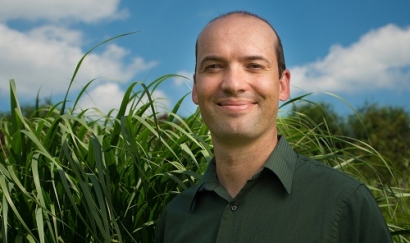
Researchers at Michigan State University will use a $1.1 million U.S. Department of Energy grant to fight disease in switchgrass by identifying regions of the genome that cause disease resistance. Locating these disease-fighting regions will help improve switchgrass' viability. Those thriving switchgrass plants could play a crucial role in the emerging bio-based economy by providing a consistent source of biofuels and diverse bioproducts.
"I am very interested in using evolutionary principles to improve biofuel crops," said David Lowry, MSU plant biologist and grant coordinator. "We'll identify the diseases that attack switchgrass across the United States and then uncover the genetic causes of resistance to those diseases. The end result will be regionally adapted switchgrass that can thrive in different regions of the U.S."
Switchgrass can be found across much of the eastern U.S. However, switchgrass plants have different traits in the north and the south. Southern switchgrass, for example, do well in heat and can fight off fungal diseases that thrive in warm, wet climates. Northern grasses survive freezing winter temperatures, but they wither when exposed to heat, drought or disease - elements that barely bother their southern cousins.
"With larger plantings of switchgrass in the future, diseases will become much more intense. Unless controlled, these diseases will drive major crop and economic losses. We are already seeing biofuel losses due to disease of over 50 percent in some test plots," Lowry said.
Breeding programs, ones that take advantage of natural genetic variation in disease resistance, have great potential to improve resistance.
Lowry and his team will utilize new genetic mapping populations to identify genomic regions responsible for divergence in disease resistance between northern upland and southern lowland switchgrasses. The scientists also will conduct a genome wide association study to identify genes involved in disease resistance. Together these approaches will uncover the causes of disease resistance in switchgrass and provide valuable insights that can be used by breeders to produce more resilient crops.
The seeds of this research have already been planted. Lowry has already established 10 growing sites across the central U.S., spanning 17 degrees of latitude from Texas to Michigan. The research will be conducted in collaboration with Gary Bergstrom at Cornell University.
For Information: Michigan State Ubniversity
Photo: David Lowry courtesy of MSU

